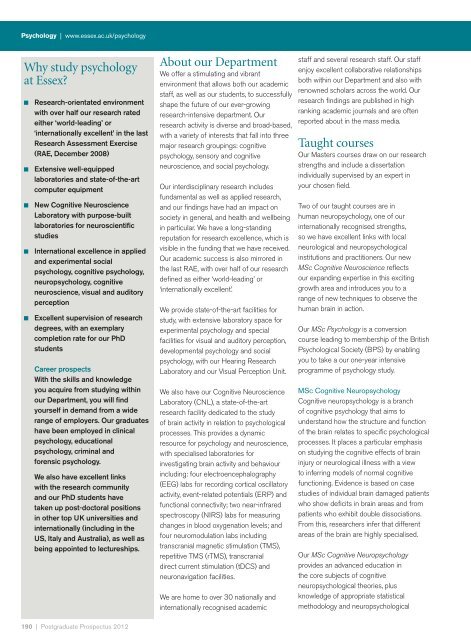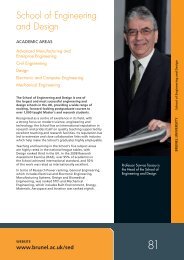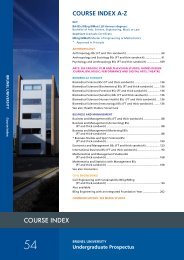Postgraduate Prospectus
Postgraduate Prospectus
Postgraduate Prospectus
You also want an ePaper? Increase the reach of your titles
YUMPU automatically turns print PDFs into web optimized ePapers that Google loves.
Psychology | www.essex.ac.uk/psychology<br />
Why study psychology<br />
at Essex?<br />
n<br />
n<br />
n<br />
n<br />
n<br />
Research-orientated environment<br />
with over half our research rated<br />
either ‘world-leading’ or<br />
‘internationally excellent’ in the last<br />
Research Assessment Exercise<br />
(RAE, December 2008)<br />
Extensive well-equipped<br />
laboratories and state-of-the-art<br />
computer equipment<br />
New Cognitive Neuroscience<br />
Laboratory with purpose-built<br />
laboratories for neuroscientific<br />
studies<br />
International excellence in applied<br />
and experimental social<br />
psychology, cognitive psychology,<br />
neuropsychology, cognitive<br />
neuroscience, visual and auditory<br />
perception<br />
Excellent supervision of research<br />
degrees, with an exemplary<br />
completion rate for our PhD<br />
students<br />
Career prospects<br />
With the skills and knowledge<br />
you acquire from studying within<br />
our Department, you will find<br />
yourself in demand from a wide<br />
range of employers. Our graduates<br />
have been employed in clinical<br />
psychology, educational<br />
psychology, criminal and<br />
forensic psychology.<br />
We also have excellent links<br />
with the research community<br />
and our PhD students have<br />
taken up post-doctoral positions<br />
in other top UK universities and<br />
internationally (including in the<br />
US, Italy and Australia), as well as<br />
being appointed to lectureships.<br />
About our Department<br />
We offer a stimulating and vibrant<br />
environment that allows both our academic<br />
staff, as well as our students, to successfully<br />
shape the future of our ever-growing<br />
research-intensive department. Our<br />
research activity is diverse and broad-based,<br />
with a variety of interests that fall into three<br />
major research groupings: cognitive<br />
psychology, sensory and cognitive<br />
neuroscience, and social psychology.<br />
Our interdisciplinary research includes<br />
fundamental as well as applied research,<br />
and our findings have had an impact on<br />
society in general, and health and wellbeing<br />
in particular. We have a long-standing<br />
reputation for research excellence, which is<br />
visible in the funding that we have received.<br />
Our academic success is also mirrored in<br />
the last RAE, with over half of our research<br />
defined as either ‘world-leading’ or<br />
‘internationally excellent’.<br />
We provide state-of-the-art facilities for<br />
study, with extensive laboratory space for<br />
experimental psychology and special<br />
facilities for visual and auditory perception,<br />
developmental psychology and social<br />
psychology, with our Hearing Research<br />
Laboratory and our Visual Perception Unit.<br />
We also have our Cognitive Neuroscience<br />
Laboratory (CNL), a state-of-the-art<br />
research facility dedicated to the study<br />
of brain activity in relation to psychological<br />
processes. This provides a dynamic<br />
resource for psychology and neuroscience,<br />
with specialised laboratories for<br />
investigating brain activity and behaviour<br />
including: four electroencephalography<br />
(EEG) labs for recording cortical oscillatory<br />
activity, event-related potentials (ERP) and<br />
functional connectivity; two near-infrared<br />
spectroscopy (NIRS) labs for measuring<br />
changes in blood oxygenation levels; and<br />
four neuromodulation labs including<br />
transcranial magnetic stimulation (TMS),<br />
repetitive TMS (rTMS), transcranial<br />
direct current stimulation (tDCS) and<br />
neuronavigation facilities.<br />
We are home to over 30 nationally and<br />
internationally recognised academic<br />
staff and several research staff. Our staff<br />
enjoy excellent collaborative relationships<br />
both within our Department and also with<br />
renowned scholars across the world. Our<br />
research findings are published in high<br />
ranking academic journals and are often<br />
reported about in the mass media.<br />
Taught courses<br />
Our Masters courses draw on our research<br />
strengths and include a dissertation<br />
individually supervised by an expert in<br />
your chosen field.<br />
Two of our taught courses are in<br />
human neuropsychology, one of our<br />
internationally recognised strengths,<br />
so we have excellent links with local<br />
neurological and neuropsychological<br />
institutions and practitioners. Our new<br />
MSc Cognitive Neuroscience reflects<br />
our expanding expertise in this exciting<br />
growth area and introduces you to a<br />
range of new techniques to observe the<br />
human brain in action.<br />
Our MSc Psychology is a conversion<br />
course leading to membership of the British<br />
Psychological Society (BPS) by enabling<br />
you to take a our one-year intensive<br />
programme of psychology study.<br />
MSc Cognitive Neuropsychology<br />
Cognitive neuropsychology is a branch<br />
of cognitive psychology that aims to<br />
understand how the structure and function<br />
of the brain relates to specific psychological<br />
processes. It places a particular emphasis<br />
on studying the cognitive effects of brain<br />
injury or neurological illness with a view<br />
to inferring models of normal cognitive<br />
functioning. Evidence is based on case<br />
studies of individual brain damaged patients<br />
who show deficits in brain areas and from<br />
patients who exhibit double dissociations.<br />
From this, researchers infer that different<br />
areas of the brain are highly specialised.<br />
Our MSc Cognitive Neuropsychology<br />
provides an advanced education in<br />
the core subjects of cognitive<br />
neuropsychological theories, plus<br />
knowledge of appropriate statistical<br />
methodology and neuropsychological<br />
190 | <strong>Postgraduate</strong> <strong>Prospectus</strong> 2012

















